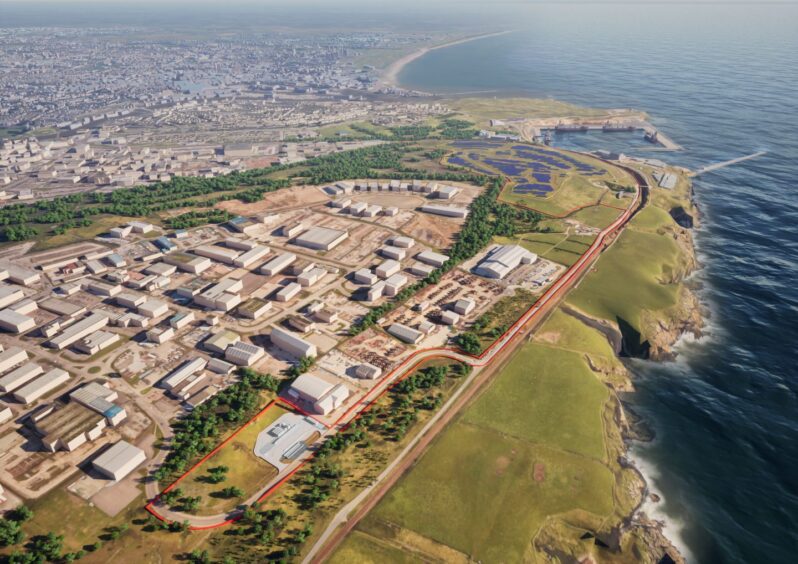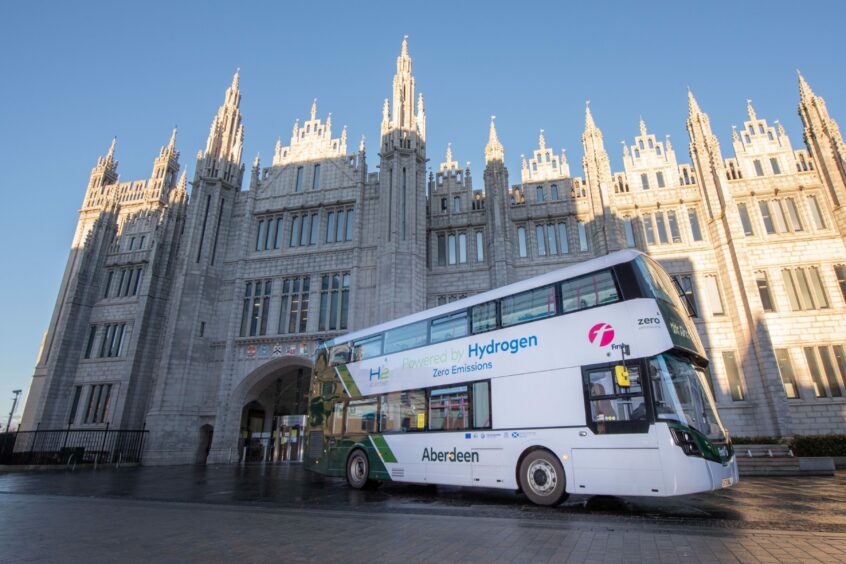
BP is set to release a report on how its Aberdeen City Council joint venture will help the local supply chain scale up work in the hydrogen sector.
BP Aberdeen Hydrogen Energy Limited chief executive Oliver Taylor told Energy Voice: “As part of our activities within the joint venture, we are supporting the development of local supply chains.
“One of the things that we have done is taking the opportunity to look at the in-place capabilities that are there for suppliers today in Aberdeen and the broader Scotland region, and what those gaps might be to build something like the Aberdeen Hydrogen Hub.”
The energy supply chain in the north-east of Scotland is the jewel in the crown of Europe’s oil and gas capital and employs hundreds of highly skilled people in the region.
However, on first impressions, hydrogen is an area where firms have yet to commit seriously. There is, to Energy Voice’s knowledge, no firms that produce electrolysers in the region.
Electrolysers are a key component in the production of hydrogen as they split water molecules for developers to obtain the renewable energy source.
Taylor added: “We’ve gone through a robust procurement process to select our suppliers.
“We are proud of the fact that we’re using many local suppliers for the construction and commissioning of the facility. We will separately be announcing who those different contractors will be.”
Benefits to the ‘people of Aberdeen and particularly for the energy sector’
On Monday, Aberdeen City Council and BP announced they had taken a final investment decision on its project following delays.
It is understood this is the first of three possible phases of development and will cost around £40 million.
A £215 million price tag has been put on the entire, scalable, Aberdeen Hydrogen Hub which could increase production in step with demand.
A joint venture, the local authority and BP agreed in 2022 to build the plant to produce, store and distribute around 300 tonnes of the fuel per year at a site in Harness Road, Aberdeen.
Taylor said that, despite the delays, “the really important news is that we’ve achieved final investment decision.”
Aberdeen City Council co-leader Christian Allard explained why the decision was pushed back.
“We’ve got a lot of projects on as Aberdeen City Council so does BP so you can understand that we needed to make sure that joint venture works very well for the both of us, and it does,” he said.
“It does very well for the people of Aberdeen and particularly for the energy sector.”
When pushed on whether the approval of the Hydrogen Hub was fast-tracked, given the importance of the project, Allard said it was “absolutely” bumped up the list of projects waiting for the local authority’s stamp of approval.
There have been multiple reports by the likes of DNV, EIC and the Climate Change Committee, outlining that the world is not on track to reach its net zero targets.
Earlier this year, the Climate Change Committee reported that the level of emissions reductions needed for Scotland to reach its 2030 climate change targets is now “beyond what is credible” to be achieved.
Taylor commented: “I think, generally, the energy transition is moving slightly slower than we’d anticipated, and I think industry at large would like.”
This has contributed to the delays on the Aberdeen Hydrogen Hub’s final investment decision.
“It’s taken additional time for us to go through that due diligence to make sure that we’re making a prudent investment in line with the right demand and the right trajectory for the hydrogen economy,” Taylor added.
‘What it impacts the most is jobs’
Recently, the London-listed supermajor has come under fire for scaling back its green energy commitments.
It has been reported that BP (LON: BP) is imposing a hiring freeze and pausing new offshore wind projects amid investor discontent over its low-carbon strategy.
On this, Taylor commented: “BP has an ambition stated to back Britain, so that’s to support Britain’s energy systems of today and to invest in those energy systems of the future.
“This project is an example of us taking a final investment decision, working with a public body to secure benefits of a low-carbon energy system of the future by investing in a green hydrogen production distribution facility.
“That’s important because these kinds of projects allow us not only to deliver the demands that society has at large today but also to invest in and stimulate the kinds of low-carbon energy systems that we need in future.”
A report commissioned by Aberdeen City Council claimed there could be up to 700 skilled jobs across the hydrogen industry by the end of the decade if the Aberdeen Hydrogen Hub is scaled up to produce the fuel for export.
Allard commented on how this project will be supporting Aberdeen’s energy workforce, saying: “I think what it impacts the most is jobs, job transition, it is so important that we do that.
“It’s not only jobs into constructing and developing that hydrogen and green hydrogen, but it’s also, and more importantly maybe, helping the research.”
Taylor added: “Aberdeen has been recognised as an energy capital, not only in the UK but more broadly in Europe for decades. It’s a pioneering city and it’s a city that, with this project, can help invest in and build capability in a new sector, that being low-carbon hydrogen and specifically on this project, green hydrogen.
“That’s a really good outcome for the people of Aberdeen, but also more broadly at the Scotland level and the UK as well, because it allows the development of new skills where that makes sense, the transition from conventional forms of energy or in terms of new opportunities for growth to develop into new industrial offtake.”
Recommended for you


 © Supplied by BP
© Supplied by BP © Supplied by Kami Thomson/DC Thom
© Supplied by Kami Thomson/DC Thom © Supplied by Wrightbus
© Supplied by Wrightbus